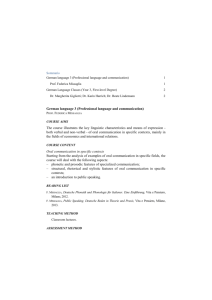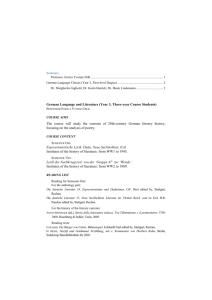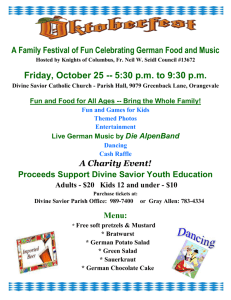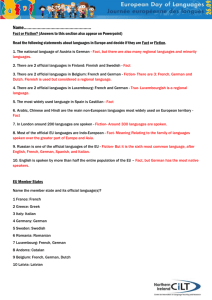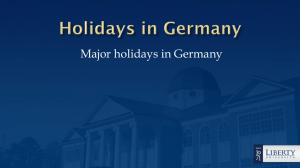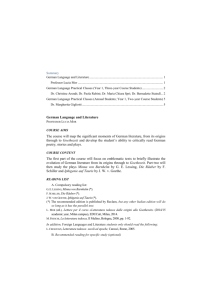German Language and Literature (Year 2, Three
advertisement
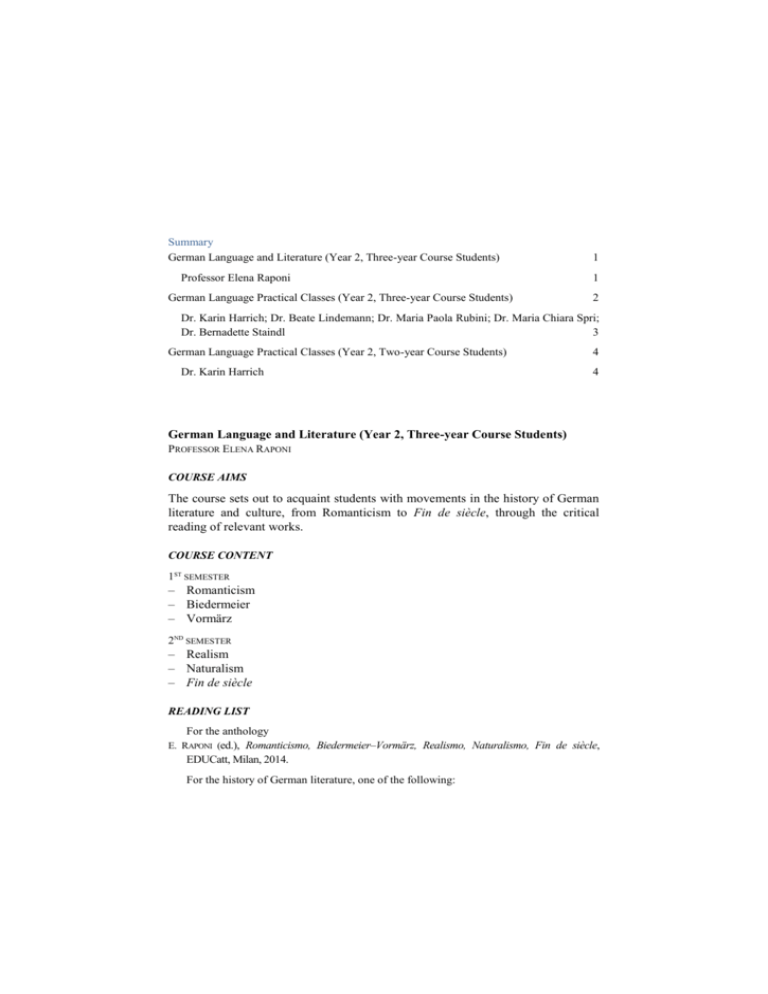
Summary German Language and Literature (Year 2, Three-year Course Students) Professor Elena Raponi German Language Practical Classes (Year 2, Three-year Course Students) 1 1 2 Dr. Karin Harrich; Dr. Beate Lindemann; Dr. Maria Paola Rubini; Dr. Maria Chiara Spri; Dr. Bernadette Staindl 3 German Language Practical Classes (Year 2, Two-year Course Students) Dr. Karin Harrich 4 4 German Language and Literature (Year 2, Three-year Course Students) PROFESSOR ELENA RAPONI COURSE AIMS The course sets out to acquaint students with movements in the history of German literature and culture, from Romanticism to Fin de siècle, through the critical reading of relevant works. COURSE CONTENT 1ST SEMESTER – Romanticism – Biedermeier – Vormärz 2ND SEMESTER – Realism – Naturalism – Fin de siècle READING LIST For the anthology E. RAPONI (ed.), Romanticismo, Biedermeier–Vormärz, Realismo, Naturalismo, Fin de siècle, EDUCatt, Milan, 2014. For the history of German literature, one of the following: M. DALLAPIAZZA-U. KINDL (ed.), Storia della letteratura tedesca. Vol. 2. Dal Settecento alla prima guerra mondiale, Laterza, Roma-Bari, 2001 (pp. 144-386). M. FRESCHI, La letteratura tedesca, il Mulino, Bologna, 2008 (pp. 86-126 e pp. 165-181). Additional information on the reading list will be provided during the course. Students should visit the lecturer’s webpage to get the definitive syllabus and reading list. TEACHING METHOD Classroom lectures. ASSESSMENT METHOD Oral exam. NOTES This Special Subject course will be accompanied by 20 hours of practical classes held by Dr. Gloria Colombo on the translation of the poetic works studied in the course; the first 10 hours of the practical classes are scheduled for Semester 1 and the final 15 hours for Semester 2. Students should check the lecturer's webpage regularly for course updates and information (go to the docenti link on the university website's homepage and key in the name of the lecturer). The following students must attend both semesters: First-level degree course students in Language Sciences specializing in Languages, Literature and Communication and in Foreign Languages and Literature; and Second-level degree course students of the Faculty of Language Sciences taking their second year of the First-level degree course in Media Language, specializing in Theatre, Cinema, Video and Ritual. The following students should choose and attend just one semester: First-level degree course students of Language Sciences specializing in Applied Foreign Languages; Language Expert for Management and Tourism; Languages, Literature and Communication; Languages, Communication and Media. Arts degree students who wish to attend German Language and Literature lectures should contact the lecturer directly. Further information can be found on the lecturer's webpage at http://docenti.unicatt.it/web/searchByName.do?language=ENG or on the Faculty notice board. German Language Practical Classes (Year 2, Three-year Course Students) DR. KARIN HARRICH; DR. BEATE LINDEMANN; DR. MARIA PAOLA RUBINI; DR. MARIA CHIARA SPRI; DR. BERNADETTE STAINDL COURSE AIMS The course sets out to take students to level B2 in language comprehension and production, as defined in the Common European Framework. The practical activities are designed to enable students to consolidate their active and passive knowledge of morphosyntactic and lexical structures in spoken and written communication in standard varieties of German. The teaching programme comprises: – practice and testing of phonetic skills, with special focus on prosodic features; – continuation and completion of the study of morphosyntactic structures; – exercises in the comprehension and production of various types of oral and written documents (dialogue, descriptive, narrative, argument-based texts); – translation practice; – dictation. READING LIST Em neu 2008 Hauptkurs, Hueber, Ismaning/München (ISBN 978-3-19-501695-7). Em neu 2008 Hauptkurs Arbeitsbuch + CD, Hueber, Ismaning/München (ISBN 978-3-19511695-4). HERING-MATUSSEK, Em Übungsgrammatik: Deutsch als Fremdsprache für die Mittelstufe, Hueber, München. TSCHIRNER, Grund- und Aufbauwortschatz Deutsch als Fremdsprache nach Themen, Cornelsen Verlag, Berlin 2008 (ISBN 978-3-589-01559-7). Each student must bring the following: a. reference grammar manual: DREYER-SCHMITT, Lehr- und Übungsbuch der deutschen Grammatik aktuell, Hueber, München, (with the text of the Lösungsschlüssel). Em neu 2008 Hauptkurs, Audio-CD, Hueber, Ismaning/München. b. a bilingual dictionary, a monolingual dictionary with synonyms and antonyms and a stylistic dictionary (for use throughout the course): L. GIACOMA-S. KOLB (EDS.), Il dizionario di Tedesco, Zanichelli/Klett, Bologna. Dit, Dizionario Tedesco-Italiano/Italiano-Tedesco, Paravia, Turin. Duden, Deutsches Universalwörterbuch A-Z, 6. Auflage, Dudenverlag, Mannheim. Wahrig, Deutsches Wörterbuch, 8. neu bearbeitete Auflage, Bertelsmann, Gütersloh. Duden, Das Stilwörterbuch (Der Duden in zwölf Bänden), Bd. 2. Dudenverlag, Mannheim. Duden, Sinn- und sachverwandte Wörter/ Synonymwörterbuch der deutschen Sprache (Der Duden in zwölf Bänden), Bd. 8. Dudenverlag, Mannheim. c. Go to “Centro per l’Autoapprendimento” (or “CAP”, the self-learning centre on the 3rd floor of Via Morozzo della Rocca) to find further reading for personal study; the student should consult with the CAP advisor to agree the best study plan for their language level (www.unicatt.it/selda-cap). ASSESSMENT METHOD The written exam consists of a test including the following parts: a dictation, a morphosyntax and vocabulary test, an oral comprehension test, a written test and a translation (for the latter, students are permitted to use a monolingual German dictionary). The oral exam consists of a conversation regarding a selection of readings and audio texts taken from Em neu 2008 Hauptkurs: five newspaper and magazine articles concerning the topics dealing with Em neu; three articles on a subject relative to the student’s field of study. NOTES Students should ensure they read all the titles and materials indicated on the reading list. The lecturer will provide further information on the syllabus and on the written and oral exams during the course. Further information can be found on the lecturers' webpage at http://docenti.unicatt.it/web/searchByName.do?language=ENG or on the Faculty notice board. German Language Practical Classes (Year 2, Two-year Course Students DR. KARIN HARRICH COURSE AIMS The course will analyse original German-language texts to enable the student to consolidate the knowledge gained in Year 1 of the Two-year Course to strengthen their written and spoken comprehension and production abilities. COURSE CONTENT Reading/listening and analysis of various types of original-language texts chosen to match the attending students’ language level and specific field of study. The text analysis part is intended to strengthen the knowledge of the main morphosyntactic structures and comprehension strategies acquired by the student in the preceding course. READING LIST Aspekte. Lehr- und Arbeitsbuch 1 Teil 1. Sprachniveau B1+ (single volume edition with 1 audio CD), Langenscheidt bei Klett, Berlin, 2010 (ISBN: 978-3-12-606007-3). Em Übungsgrammatik. Deutsch als Fremdsprache, Max Hueber Verlag, Ismaning, 2002. H. DREYER-R. SCHMITT, Grammatica tedesca con esercizi, Verlag für Deutsch, Ismaning, München. The following instructions apply to all students: a. Bring the following language and monolingual dictionaries to classes: L. GIACOMA-S. KOLB (eds.), Il dizionario di Tedesco, Zanichelli/Klett, Bologna. Dit, Dizionario Tedesco-Italiano/Italiano-Tedesco, Paravia, Turin. Duden, Deutsches Universalwörterbuch A-Z, Dudenverlag, Mannheim, 6. Auflage. Wahrig, Deutsches Wörterbuch, Bertelsmann, Gütersloh, 8. neu bearbeitete Auflage. b. Go to “Centro per l’Autoapprendimento” (or “CAP”, the self-learning centre on the 3rd floor of Via Morozzo della Rocca) to find further reading for personal study; the student should consult with the CAP tutor to agree the best study plan for their language level (www.unicatt.it/selda-cap). ASSESSMENT METHOD The exam is split into a written and an oral part and is to be taken in German as a preliminary requirement for the Literature or the Linguistics exam held by the corresponding lecturer. The written part will test the student’s ability to comprehend and/or produce a German text (based on newspaper/magazine or literary texts in line with the student’s curriculum). The student must first pass the written exam to qualify for the oral exam. The oral exam will test the student’s ability to communicate in a simple but correct way on everyday topics and to present in a personal way the contents of a variety of text types. NOTES Further information can be found on the lecturer's webpage at http://docenti.unicatt.it/web/searchByName.do?language=ENG, or on the Faculty notice board.
